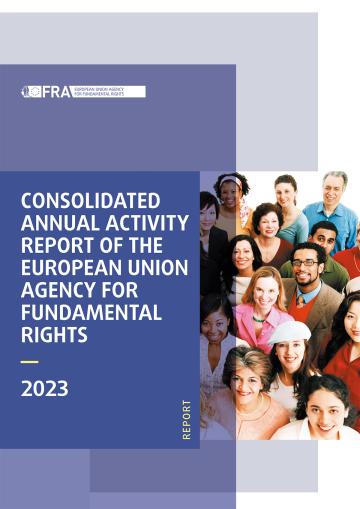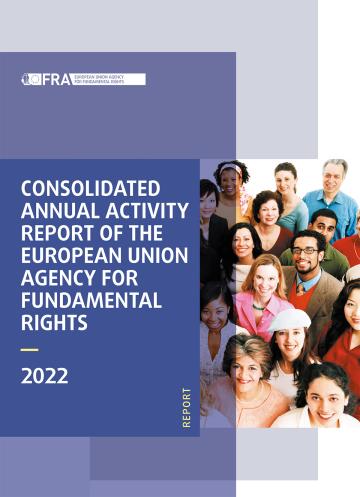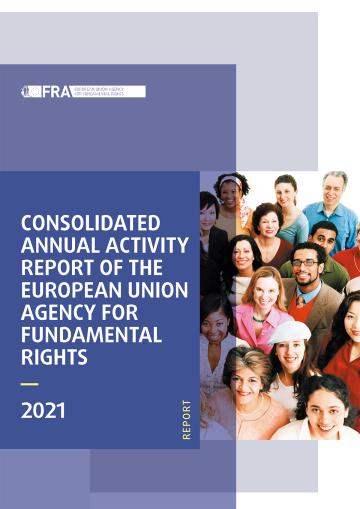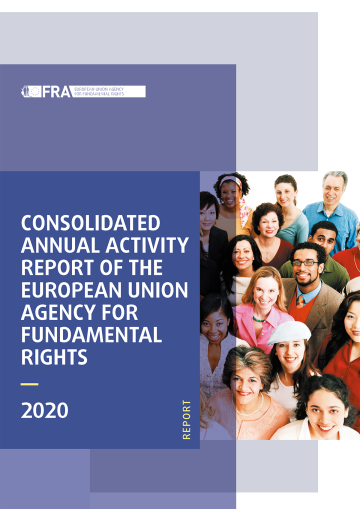Strategic priority 1: support the upholding of fundamental rights standards in the development of new EU laws and policies
In 2023, FRA fulfilled its key role in informing and supporting policymakers in the development of new EU laws and policies. It did so by producing information on fundamental rights issues that is largely based on robust, reliable and useful data on the respect of fundamental rights across the EU. The agency provided advice and opinions based on research and analysis of the main current and future challenges in the field of fundamental rights.
Stakeholders highly valued this work and recognised the reliability and usefulness of FRA research, as well as the agency’s role in promoting a human rights culture across the EU. Indeed, 89 % of stakeholders responding to FRA’s publication survey said that the publications are useful and relevant to their work, and 91 % said that they are reliable.
In 2023, FRA carried out a number of projects and published different reports and data on fundamental rights, including the following.
- The second edition of the report Being Black in the EU – Experiences of people of African descent. This flagship report publicised key results of FRA’s third large-scale EU survey on immigrants and descendants of immigrants. It was among the publications that received the most attention from stakeholders and media. The report provided relevant input to the European Commission’s 2020–2025 EU anti-racism action plan progress report.
- The comparative report Promoting migrant integration – Strengthening EU law on long-term residence explored the main challenges in implementing the EU’s long-term residence directive. FRA presented the study to the European Parliament and the Council of the European Union, and it was referenced in the European Commission’s impact assessment accompanying the proposal for the recast directive.
- The comparative report Underpinning Victims’ Rights: Support services, reporting and protection explored the main challenges in implementing the victims’ rights directive in practice. The key findings and opinions were presented to the European Commission, the Council and the European Parliament in the context of the ongoing revision of the directive. That resulted in, among other things, the proposed revision explicitly acknowledging FRA’s role in data collection.
- The report Protecting human rights defenders at risk: EU entry, stay and support, in which FRA, responding to a European Parliament request, outlined how human rights defenders can enter and stay in the EU, when in need of protection. The report received a great deal of attention. The upcoming revision of the Visa Code Handbook will incorporate language addressing some of the shortcomings that FRA identified.
Strategic priority 2: contribute to ensuring respect, protection and fulfilment of fundamental rights in the fields covered by existing EU laws and policies
In 2023, FRA conducted in-depth research and provided advice, opinions and real-time assistance to support EU policymakers in implementing existing EU laws and policies. The agency strengthened its role as a key reliable partner for stakeholders in integrating a human rights perspective into the application of laws and policies. This was confirmed by the majority of stakeholders responding to the survey. Indeed, 90 % of them agreed or strongly agreed that FRA contributed to making fundamental rights more visible at the EU level, and 90 % that the agency contributed to developing a human rights culture at the EU level.
FRA was active in providing support to policymakers in the adoption of policies responding to the continuation of the Russian war of aggression against Ukraine. For instance, the agency provided real-time assistance to stakeholders, while working on some key publications such as the reports Fleeing Ukraine: Displaced People’s Experiences in the EU and Fleeing Ukraine: Implementing Temporary Protection at Local Level. Both studies explored best practices, and the challenges that people fleeing Ukraine face when arriving in the EU.
Following the large shipwreck incident off the Peloponnese coast, in July 2023 FRA published a report on Preventing and responding to deaths at Sea: What the European Union can do. It lists actions that the EU and its Member States can take to reduce fatalities at sea.
Importantly, the work on data collection to support policymaking was also carried out through updating the online compendium of practices for equality data collection. That helped support Member States and other stakeholders in collecting and analysing equality data. FRA supported the European Commission in collecting information on the implementation of national Roma strategic frameworks in the Member States and analysing the achievements reported through this data collection instrument. The results are reflected in the annual communication on Roma inclusion that will be published in 2024.
FRA also supported the European Commission by providing input to the midterm review of the 2020–2025 lesbian, gay, bisexual, transgender, intersex and queer (or questioning) (LGBTIQ) equality strategy, based on the findings emerging from the third FRA LGBTIQ Survey. Moreover, the agency updated the anti-Muslim hatred database, which provides information on hate speech and discrimination against Muslims.
In addition, FRA advised on the implementation of the novel horizontal enabling conditions related to fundamental rights for the use of EU funds. It issued a report that suggested a more systematic involvement of national fundamental rights bodies and civil society.
Among its key activities, FRA supported the EU lawmakers in the ongoing revision of the victims’ rights directive, in particular by publishing the report Underpinning Victims’ Rights: Support services, reporting and protection. In the report, FRA highlighted the issues that are key to the effective implementation of victims’ rights in practice and hence warrant further attention in revising the directive. To further support relevant EU actors in the proposed revision, FRA provided evidence-based advice by presenting key findings in this area at various meetings, including the Council’s Working Party on Judicial Cooperation in Criminal Matters and the European Parliament’s Committee on Civil Liberties, Justice and Home Affairs. In addition, FRA actively contributed to the work of the Commission’s Victims’ Rights Platform and other activities in the context of the implementation of the EU strategy on victims’ rights (2020–2025).
To support policymaking, FRA worked with a number of institutional stakeholders, including the European Commission, the European Parliament, the Council of the European Union and other justice and home affairs agencies, as well as international organisations such as the Council of Europe (CoE) and the UN.
Strategic priority 3: engage in cross-cutting actions to support the realisation of the EU’s fundamental rights goals and vision
In 2023, FRA implemented cross-cutting initiatives to support the realisation of the EU’s overarching objectives and vision for fundamental rights. These included creating research instruments and methodologies, raising awareness of fundamental rights, collaborating with important stakeholders and encouraging communication among them, at all levels and in all sectors.
In the field of technical assistance, FRA was particularly active in the area of migration and asylum, by responding to 80 requests for assistance and capacity building by EU, international and national authorities.
Among the key activities on awareness raising, FRA continued its work on promoting and disseminating its expertise and evidence on the Charter of Fundamental Rights of the European Union, by organising events and contributing to the training of legal professionals in cooperation with relevant networks and partners.
FRA worked on developing several research instruments and databases. Among them was the Roma Survey, confirmed as one of the agency’s flagship activities. FRA published the methodology of the 2021 Roma Survey and made the whole dataset available, while preparing to launch the new round of the survey, the 2024 Roma Survey. This activity contributed a great deal to keeping the debate on promoting Roma inclusion on the policy agenda.
Throughout 2023, FRA conducted several activities in partnership with other institutions and organisations. The CoE remained one of the key stakeholders, with the shared objective of promoting and protecting human rights in Europe. For instance, FRA contributed its evidence, through the EU delegation, to the negotiations on the future CoE Convention on Artificial Intelligence; cooperated with the Group of Experts on Action against Violence against Women and Domestic Violence (Grevio), tasked with monitoring the implementation of the Istanbul Convention; and published the joint note ‘Children in migration: Fundamental rights at European borders’.
FRA also continued its cooperation with the UN, for instance by supporting and working with the UN High Commissioner for Human Rights and with the Organization for Security and Co-operation in Europe (OSCE). For example, FRA’s Director delivered the keynote speech at the 2023 OSCE Human Dimension Conference.
To support the realisation of the EU’s fundamental rights vision, the work was conducted in close cooperation with the EU’s institutions, bodies and agencies.
FRA worked extensively on the communication of its activities, being active on the main social networks, responding to media requests, delivering speeches, participating in events and publishing reports, data and studies. The number of followers on social media grew in 2023, as did the numbers of media requests, FRA website page views and visits, and the number of data visualisation charts generated. More subscribers than in 2022 also registered for FRA’s newsletter and on the e-learning platform. In 2023, FRA was second only to the European Commission in the number of publications ordered through the Publications Office of the EU. FRA publications accounted for 91 % of the total EU agency publications ordered through the Publications Office.




